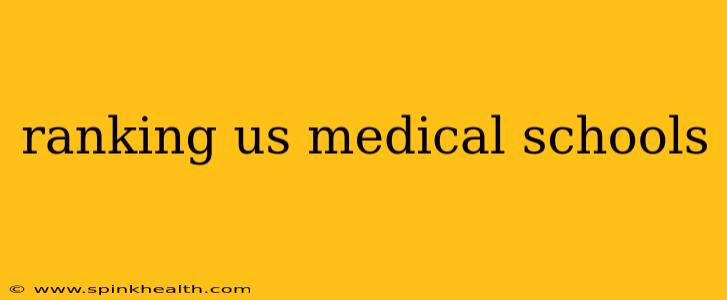Choosing a medical school is arguably one of the most significant decisions a prospective physician will ever make. It's not just about earning a degree; it's about shaping a career dedicated to healing and impacting lives. The sheer number of excellent medical schools in the US can feel overwhelming, and relying solely on ranking lists can be misleading. This article explores the nuances of US medical school rankings, delving beyond simple numerical scores to uncover the factors that truly contribute to a school's prestige and its students' success.
My journey into the world of medical school rankings began with my own research. As a former medical student, I remember the countless hours spent poring over rankings, comparing metrics, and trying to decipher what truly mattered. This experience, coupled with years of following the medical education landscape, fuels my passion for demystifying this complex process.
What Factors Determine Medical School Rankings?
Several factors contribute to the rankings you see published annually by organizations like US News & World Report. These rankings are often criticized for their methodology, but understanding the contributing factors allows for a more nuanced perspective. Key factors usually include:
- Research Funding: Schools with substantial research grants and high-impact publications often rank higher. This reflects the school's commitment to advancing medical knowledge and pushing the boundaries of healthcare.
- Faculty Reputation: The prestige of the faculty, often measured by accolades, publications, and grants, heavily influences rankings. Renowned professors attract top students and contribute to a vibrant learning environment.
- Student Selectivity: A highly selective admissions process, typically indicated by a low acceptance rate, often correlates with a higher ranking. This signifies the school's rigorous standards and the caliber of its student body.
- Residency Placement: The success of graduates in securing competitive residency positions is a crucial indicator of the school's effectiveness in training future physicians.
- Alumni Network: A robust and influential alumni network can significantly impact a medical school's reputation and the career opportunities available to its graduates.
- Clinical Resources: Access to state-of-the-art facilities, diverse patient populations, and experienced clinical preceptors are all essential elements that contribute to the quality of medical education and influence rankings.
How Reliable are Medical School Rankings?
The reliability of medical school rankings is often debated. While they provide a general overview, they shouldn't be the sole determinant in your decision-making process. Here's why:
- Subjectivity: Ranking methodologies often incorporate subjective elements, leading to potential biases and inconsistencies.
- Focus on Research: Some rankings heavily emphasize research output, potentially overlooking schools with strong clinical training programs.
- Limited Perspective: Rankings might not capture the unique strengths or specialized programs offered by individual schools. A school excelling in a specific area might be overlooked in an overall ranking.
What are the Best Medical Schools in the US?
Instead of presenting a rigid "best of" list (which can change drastically year to year based on methodology and data), it’s more helpful to focus on categories of excellence. Many schools consistently appear near the top of various rankings and boast exceptional programs. Examples include, but are not limited to, Harvard Medical School, Johns Hopkins University School of Medicine, and the University of Pennsylvania Perelman School of Medicine. However, countless other schools provide excellent education and training, often specializing in particular areas of medicine.
What are the top medical schools for research?
Schools with a strong focus on research often receive significant funding, attracting leading scientists and fostering groundbreaking discoveries. These institutions often excel in attracting highly competitive NIH grants. Again, this is a dynamic area, and specific top performers can shift, depending on funding cycles and faculty changes. It's crucial to research the specific area of research that interests you to pinpoint schools with strong reputations within that niche.
What are the best medical schools for primary care?
Many medical schools excel at training future primary care physicians. The quality of primary care training depends on factors like mentorship from experienced primary care physicians, access to diverse patient populations in various settings, and opportunities for longitudinal clinical experiences in community-based clinics. It's advisable to research individual schools' curriculum and faculty to determine the strength of their primary care training.
What should I consider when choosing a medical school?
Ultimately, choosing a medical school requires careful consideration of your personal goals, learning style, and career aspirations. Factors to consider include:
- Program Fit: Consider the curriculum, teaching style, and research opportunities that align with your interests.
- Location and Culture: Evaluate the geographic location, campus environment, and overall school culture to determine if it's a good fit for you.
- Faculty Mentorship: Seek schools where you can build strong relationships with faculty members who share your research interests or clinical specialties.
- Career Goals: Research the residency placement rates and alumni networks to gauge the school's track record in supporting your career aspirations.
The journey to becoming a physician is demanding but incredibly rewarding. Choosing the right medical school is a crucial step. By understanding the factors behind rankings and considering your individual needs and aspirations, you can make an informed decision that will shape your future as a dedicated and compassionate healthcare professional.

